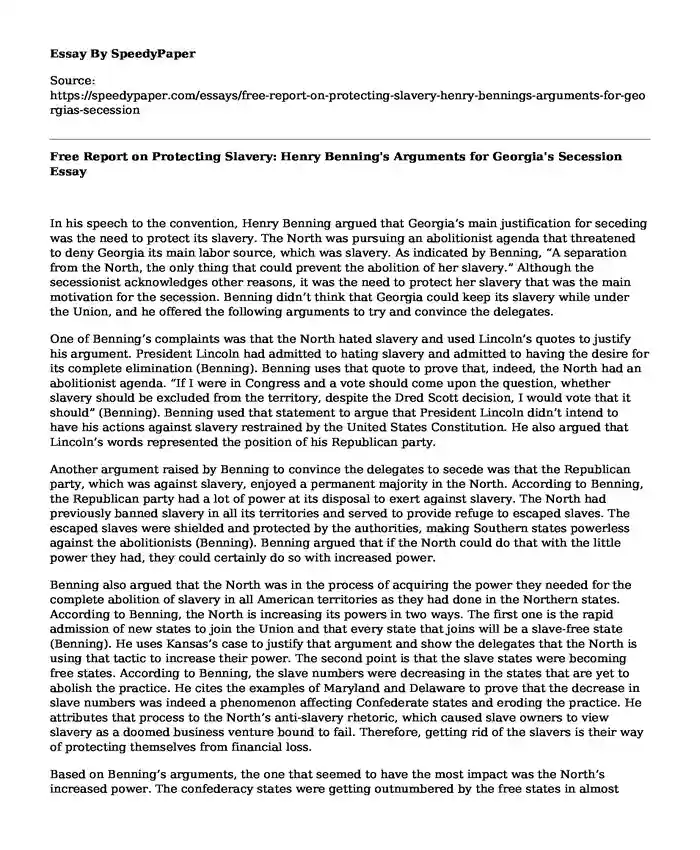
| Type of paper: | Essay |
| Categories: | Slavery |
| Pages: | 3 |
| Wordcount: | 640 words |
In his speech to the convention, Henry Benning argued that Georgia’s main justification for seceding was the need to protect its slavery. The North was pursuing an abolitionist agenda that threatened to deny Georgia its main labor source, which was slavery. As indicated by Benning, “A separation from the North, the only thing that could prevent the abolition of her slavery.” Although the secessionist acknowledges other reasons, it was the need to protect her slavery that was the main motivation for the secession. Benning didn’t think that Georgia could keep its slavery while under the Union, and he offered the following arguments to try and convince the delegates.
One of Benning’s complaints was that the North hated slavery and used Lincoln’s quotes to justify his argument. President Lincoln had admitted to hating slavery and admitted to having the desire for its complete elimination (Benning). Benning uses that quote to prove that, indeed, the North had an abolitionist agenda. “If I were in Congress and a vote should come upon the question, whether slavery should be excluded from the territory, despite the Dred Scott decision, I would vote that it should” (Benning). Benning used that statement to argue that President Lincoln didn’t intend to have his actions against slavery restrained by the United States Constitution. He also argued that Lincoln’s words represented the position of his Republican party.
Another argument raised by Benning to convince the delegates to secede was that the Republican party, which was against slavery, enjoyed a permanent majority in the North. According to Benning, the Republican party had a lot of power at its disposal to exert against slavery. The North had previously banned slavery in all its territories and served to provide refuge to escaped slaves. The escaped slaves were shielded and protected by the authorities, making Southern states powerless against the abolitionists (Benning). Benning argued that if the North could do that with the little power they had, they could certainly do so with increased power.
Benning also argued that the North was in the process of acquiring the power they needed for the complete abolition of slavery in all American territories as they had done in the Northern states. According to Benning, the North is increasing its powers in two ways. The first one is the rapid admission of new states to join the Union and that every state that joins will be a slave-free state (Benning). He uses Kansas’s case to justify that argument and show the delegates that the North is using that tactic to increase their power. The second point is that the slave states were becoming free states. According to Benning, the slave numbers were decreasing in the states that are yet to abolish the practice. He cites the examples of Maryland and Delaware to prove that the decrease in slave numbers was indeed a phenomenon affecting Confederate states and eroding the practice. He attributes that process to the North’s anti-slavery rhetoric, which caused slave owners to view slavery as a doomed business venture bound to fail. Therefore, getting rid of the slavers is their way of protecting themselves from financial loss.
Based on Benning’s arguments, the one that seemed to have the most impact was the North’s increased power. The confederacy states were getting outnumbered by the free states in almost every aspect of demographics and politics. The delegates decided to secede in what they termed as the oppression of the slave states. They thought that the North had accumulated power and would have had their way had they remained in the Union.
Works Cited
Benning, Henry. “Speech of Henry Benning to the Virginia Convention.” Virginia State Convention, 18 February 1861, Richmond, VA. Keynote Address.
Cite this page
Free Report on Protecting Slavery: Henry Benning's Arguments for Georgia's Secession. (2024, Jan 22). Retrieved from https://speedypaper.net/essays/free-report-on-protecting-slavery-henry-bennings-arguments-for-georgias-secession
Request Removal
If you are the original author of this essay and no longer wish to have it published on the SpeedyPaper website, please click below to request its removal:
- Free Essay on Corporate Communications: Immigration Reform
- Literary Essay Sample: Depiction of Gender Roles in the Play A Doll's House
- Free Essay about Diversity in the Workplace: Public Administration
- Free Essay on The Connection Between Literacy and Self-Formation
- Paper Example on Drout Advertising Research Project
- Free Essay: The Role of Effect in Donald Trump's Speeches Contents
- Witch Hunts and the Beginning of the Sexual Division of Labor in Sylvia Federici's Text - Essay Sample
Popular categories




